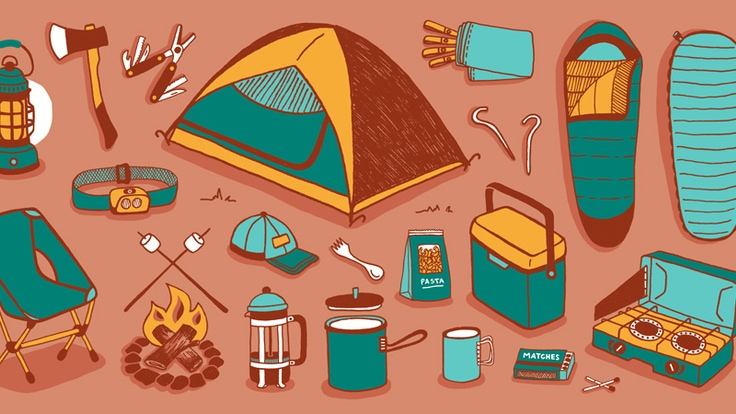Camping is a fun way to enjoy time outside with family, friends or even just yourself. And there are myriad ways (and places) to do it. You can camp with just the essentials or zhuzh up your site with blankets, pillows, a hammock and more. You can pitch a tent in many state and national parks, at private campgrounds, in the backcountry or even in your own backyard. (For more info, read Where Can I Camp?)
Most campsites include a picnic table, a place to park your vehicle and a spot to pitch your tent. Many also have shared bathrooms and running water (though you'll want to check this before setting out).
Part of the joy of camping is needing very little gear to exist outdoors. But it's also nice to have a comfortable, convenient and homey setup. If it's your first time camping, it might be best to borrow or rent some of these things. As you become a more experienced camper, you may find that part of the fun is figuring out what to bring along to meet your needs.
While you're packing, use this handy camping checklist to make sure you don't forget anything important and to make sure you've stocked up on the things you need. This is a comprehensive list, so we don't expect you to bring along every item—though we won't judge you if you do!
Printer-friendly version (PDF)
Campsite
These are important items for your camping essentials checklist:- Tent (and footprint, stakes)
- Sleeping bags
- Sleeping pads
- Camping pillow
- Headlamps or flashlights (and extra batteries)
- Camp chairs
- Camp table (if no picnic table)
- Lantern (and mantles and fuel/batteries if needed)
Optional:
- Firewood sourced near campsite
- Camp rug
- Tablecloth and clips (or tape)
- Clothesline with clips
![]()
Tools & Repair Items
- Multi-tool
- Duct tape
- Extra cord
- Tent-pole repair sleeve
- Pad/Mattress repair kit
- Mallet or hammer (for hammering tent stakes)
- Saw or axe (for cutting firewood)
- Small broom and dustpan
Kitchen
Many campgrounds have drinkable water. If not, bring your own, or be prepared to treat water if there's a water source. Also, for even more ideas and food suggestions, see our separate Camp Kitchen Checklist.- Cutting board
- Cooler
- Ice or ice substitutes
- Water bottles
- Camp sink or wash bins
- Biodegradable soap
- Pot scrubber/sponge(s)
- Trash/recycling bags
- Dish towel
Optional:
- Camp grill and fuel
- Grill rack
- Griddle
- Dutch oven
- Charcoal
- Portable coffee/tea maker
- Rolling ice cream maker
- Marshmallow/hot dog roasting forks
- Small food-storage containers/bags/foil
- Large water jugs
- Large, clear plastic bins to store kitchen gear
Campsite Extras
Most of the following items are optional, though depending on how remote your campsite is, navigation tools such as a map, compass and/or GPS may be required (for more info, read about the Ten Essentials).
- Solar and portable power
- Binoculars
- Navigation tools
- Field guides (flowers, insects)
- Star chart/night-sky identifier
- Book/reading material
- Notebook and pen/pencil
- Music player with headphones
- Games and toys
- Dog gear
- Dry bags, stuff sacks or clear plastic bins to store items
Clothing & Footwear
- Moisture-wicking underwear
- Moisture-wicking T-shirts
- Quick-drying pants/shorts
- Long-sleeve shirts (for sun, bugs)
- Lightweight fleece or jacket
- Boots or shoes suited to terrain
- Socks (synthetic or wool)
- Sleepwear
Additional items for rainy and/or cold weather:
- Rainwear (jacket and pants)
- Long underwear
- Warm insulated jacket or vest
Optional:
Health & Hygiene
- Toilet paper
- Hand sanitizer
- Toothbrush and toothpaste
- Toiletry kit
- Quick-dry towel
- Menstrual products
- Prescription medications
- First-aid kit or first-aid supplies (see First-Aid Checklist)
Sun and bug protection:
Optional:
- Urinary products
- Sanitation trowel (if no toilets)
- Baby wipes
- Alcohol or antiseptic wipes
- Mirror
- Brush/comb
- Cosmetics
- Spare eyeglasses/contact lens supplies
- Eyeshades
- Earplugs
- Portable camp shower
Personal Items
- Credit card and/or cash
- ID
- Cellphone
- Campsite reservation confirmation (if required)*
*Recreation.gov is a great resource for public lands campsite reservations; Hipcamp is a great resource for private lands campsite reservations.
